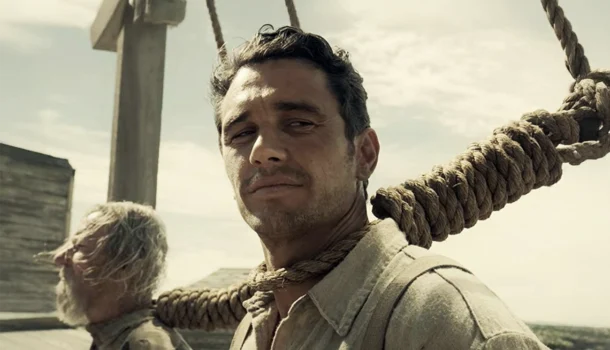Brutality, when exposed without disguise, can take the shape of a fable. In “The Ballad of Buster Scruggs,” the Coen brothers transform the Western into a narrative laboratory that rejects redeeming heroes or uplifting moralities. The frontier, often treated as a foundational American myth, is here reduced to a catalog of precarious existences, where violence precedes any notion of communal pact. By assembling six stories that revolve around a shared axis — human abandonment in the face of chance — the Coens craft a tableau that does not seek reconciliation, but rather lays bare the logic of a world where living is a gamble, and dying, a certainty.
From the opening, the visual metaphor of a book being flipped through sets the tone: fragments from a time when civilization had yet to impose itself as standard. The first tale, led by a peculiar cowboy dressed entirely in white, introduces the viewer to a universe where farce mingles with the grotesque. Buster Scruggs, the character, sings with a smile and kills with the same ease. His contradictory figure — a cheerful killer reciting moral maxims — acts as a parody of the genre’s classic heroes. But this parody is not aimed at easy laughs: it exposes the romantic hypocrisy that has long shrouded the myths of Western conquest.
Tim Blake Nelson embodies Scruggs with an unnerving accuracy. His nasal voice and exaggerated gestures clash with the lethality of his actions, creating a tension between comedy and horror. The screenplay, meticulous in its irony, subverts archetypes without discarding them — it uses them to reveal their inner contradictions. The music, stylized framing, and seemingly naïve dialogue create a veneer of innocence that shatters at the slightest provocation. This rupture is what gives the narrative its strength: the audience is invited to laugh, only to realize they are laughing at something deeply unsettling.
Among the episodes, “All Gold Canyon” perhaps best embodies the existential tension that permeates the film. In it, an old prospector played by Tom Waits searches for a gold vein in what becomes a ritual of solitary resistance. It’s not just about accumulating wealth, but about extracting meaning from a life consumed by sameness. The idyllic landscape that surrounds him serves as a counterpoint to the grueling task: each shovelful of earth is an act of persistence against the void. Waits’ performance, with a voice that feels carved out of stone, captures the exhaustion and stubbornness of a man digging not just soil, but his own justification.
Bruno Delbonnel’s camera turns the valley into a living entity, at times complicit, at others indifferent. The alternation between wide shots and claustrophobic close-ups suggests that the character’s freedom is also his punishment. Solitude here is not a circumstance — it’s an inevitable choice. When the gold finally glimmers beneath the surface, the reward brings no redemption, only the certainty that everything could be lost in an instant. It’s here that the Coens are most precise: they suggest that the value of things is always provisional, and every effort, no matter how heroic, is subject to an indifferent fate.
Despite its episodic structure, the film develops a thematic coherence reminiscent of works like “Dead of Night” (1945) or even “The Twilight Zone,” but without the comfort of a moral lesson to wrap each tale. The Coens do not tie up loose ends, nor do they offer exits. Their stories are exhibitions — there is no message, only acknowledgment. And yet, the aesthetic and narrative refinement with which they construct each segment makes the whole hypnotically disquieting. This is not a collection of good stories; it is a stylized dissection of the American spirit, in all its illusions and demons.
Among the characters who traverse these narratives, few escape unscathed. Not even the most innocent. The tragic delicacy of Alice Longabaugh (Zoe Kazan) and the absurd rigidity of the armless performer (Harry Melling) in other episodes reinforce the idea that this universe runs on the logic of downfall, not transcendence. Still, there is no gratuitous nihilism here — rather, an acceptance that human existence, when stripped of myth or nostalgia, reveals its structural fragility. And that, paradoxically, is what makes the film feel so profoundly human.
“The Ballad of Buster Scruggs” is not a stylistic exercise — it is an act of excavation. Beneath the archetypes, the humor, the postcard-worthy landscapes, pulses the question that cuts through all great fiction: what does it mean to exist in a world without guarantees? The answer, or its impossibility, reverberates in every gunshot, every silence, every page turned in that green book. And perhaps this is what makes the film unforgettable — its refusal to simplify what is, by nature, irreducibly complex.
Film: The Ballad of Buster Scruggs
Directors: Ethan and Joel Coen
Year: 2018
Genres: Drama/Western
Rating: 9/10

